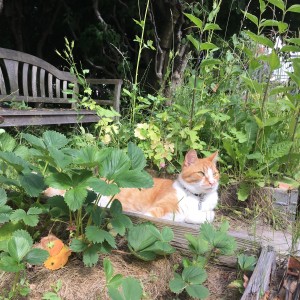”In the symbiotic community of the forest, not only trees but also shrubs and grasses – and possibly all plant species – exchange information this way. However, when we step into farm fields, the vegetation becomes very quiet. Thanks to selective breeding, our cultivated plats have, for the most part, lost their ability to communicate above or below ground – you could say they are deaf and dumb – and therefore they are prey for insect pests. That is one reason why modern agriculture uses so many pesticides.”
 It is sad to think about this, how we are robbing cultivated plants of their ability to communicate. But what makes me even sadder is that somehow, we humans have truly screwed up. I mean, my garden is an absolute paradise for insects of all sorts. It is filled with flowers blooming from early spring until late fall, it’s rife with decomposing leaves and plants, with plenty of possible holes serving as nests for both bumblebees and wild bees, no pesticides of any sort enter into it, and in all manners possible it is an extremely pollinator-friendly garden.
It is sad to think about this, how we are robbing cultivated plants of their ability to communicate. But what makes me even sadder is that somehow, we humans have truly screwed up. I mean, my garden is an absolute paradise for insects of all sorts. It is filled with flowers blooming from early spring until late fall, it’s rife with decomposing leaves and plants, with plenty of possible holes serving as nests for both bumblebees and wild bees, no pesticides of any sort enter into it, and in all manners possible it is an extremely pollinator-friendly garden.
There’s only one thing missing: The pollinators.
Sure, there’s the occasional bee (but truly, occasional, not at all to the extent we had when we first moved here thirteen years ago) and bumble bee, sometime a butterfly wisps past me, and there’s a few more flower flies and such, but to a large part: it’s not buzzing and whizzing the way 1) I want it to be and 2) it used to when we first moved here.
And as the garden itself has only gotten more and more pollinator-friendly, I come to the conclusion that the surroundings aren’t?
When will we (human beings) realize it’s not a good idea to fight against nature, but rather something which we must work with, for the good of all that reside on this planet? Will we wake up in time, you think?
Inspired to continue blogging on the theme from the #blogg100-challenge in 2017 I give you:
The book “The hidden life of trees” by Peter Wohlleben.